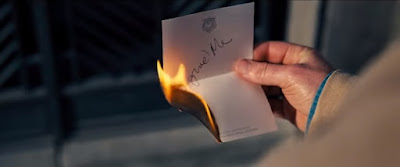Every so often you get bored with writing reviews—and I don't have a supervisor or editor (that should be obvious by a scan of the material) and I do this as a hobby and a form of preserving some space in my brain. But, one gets tired of writing Thesis/Description/Particulars/Summation on a perpetual basis. One gets in a rut, which isn't good for me (the writer) and you (the reader, one hopes). So sometimes, one experiments.
This was one of those times.
Looking back on it, I find it amusing, not exactly helpful as far as details, and the writing almost as tortured as the doomed romance portrayed.
Eh. "You win some, you lose some"...just like love.
Composed at the time of the film's release...
"Perish the Thought"*
There are many artists I would put inside the director's pantheon,
But of all those chaps, among my faves is Jane (the Aussie) Campion.
Her heroes (mostly female) both imbue and fight the schisms
that go along (as well they might) with social ostracism,
maintaining self, their specialness, not merely as statistic
that goes against the status quo of things paternalistic.
Campion works in mythic films, the types you can get lost in,
But this one takes some pages from that other Jane (Ms. Austen).
For though her films have, in the past, explored romantic themes,
I'd call them cautionary, "love's not always what it seems."But this tale of Miss Fanny Brawne and lovin' bard, John Keats
shows a more impassioned love, although keeping it discreet.
It's not like modern movies where the sex is done to death
The most explicit this one gets is int'mate shuddering breaths.
The costumes are exquisite, the period details, right
Abbie Cornish and Ben Whishaw make you feel their love's delight.
It truly is amazing the director took this chance
to realize, to dramatize unmodernized romance I wouldn't be surprised to find this one in Oscar's thicket.
That's why I grant Bright Star a most deserv'd "Full Price Ticket."**
* Shall I review Bright Star in verse?
(I don't know. I could do worse)
** My old blog—from where this thing comes—had a rating system (which I now don't do because I hate them and hate the parsing—3 stars or 4 stars? Hmmm), which based movies on the amount of money you should spend on it, which went (from highest to lowest):
Full Price Ticket
Matinee
Rental ("Rental? What's THAT?!")
Cable-Watcher
A Waste of Time
When I started B/C-L, I abandoned the rating system entirely, as I've reconsidered the monetization of worth, but, at the time, I thought it was a good idea, as it was inspired by the quote from Alfred Hitchcock: "A good film is when the price of the dinner, the theatre admission and the babysitter were worth it."
















































